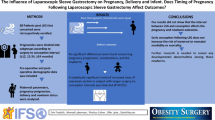Abstract
Laparoscopic sleeve gastrectomy (LSG) is an effective procedure for treating morbid obesity, and the majority of female patients who received LSG were at childbearing age. Female patients, who successfully lost weight following LSG and became pregnant, need to be evaluated carefully. Information was gathered, through prospectively maintained database and phone interview, on women who underwent LSG from May 2003 to July 2011. A total of 136 women underwent LSG in this period. There were 13 (9.6 %) pregnancies in 12 patients after LSG. The age before surgery was 28.3 ± 4.0. The mean weight and body mass index (BMI) before LSG were 95.3 ± 9.4 kg and 35.1 ± 3.5 kg/m2, respectively. The average time from LSG to the first live birth was 32.0 ± 19.1 months. Mean BMI decreased significantly after LSG, from 35.1 ± 3.5 to 24.9 ± 2.3 kg/m2 at conception. The mean percentage of excess body mass index loss was 85.8 ± 16.7 % at conception and 42.7 ± 25.1 % at delivery. Gained weight during pregnancy was 15.1 ± 5.2 kg. The mean gestational age and birth weight were 39.0 ± 1.6 weeks and 3,229.0 ± 505.9 g. In two cases (15.4 %), cesarean section was performed. No cases of pregnancy-induced hypertension and diabetes developed. Major congenital anomalies and neonatal deaths were not recorded. Larger study with longer follow-up is needed to evaluate the effect of LSG in pregnancies. However, these findings show that LSG seems to be a safe option for morbidly obese women in their reproductive period.

Similar content being viewed by others
References
Raatikainen K, Heiskanen N, Heinonen S. Transition from overweight to obesity worsens pregnancy outcome in a BMI-dependent manner. Obesity (Silver Spring). 2006;14:165–71.
ACOG Committee Opinion number 315. Obesity in pregnancy. Obstet Gynecol. 2005;106:671–5.
Weintraub AY, Levy A, Levi I, et al. Effect of bariatric surgery on pregnancy outcome. Int J Gynaecol Obstet. 2008;103:246–51.
Grundy MA, Woodcock S, Attwood SE. The surgical management of obesity in young women: consideration of the mother’s and baby’s health before, during, and after pregnancy. Surg Endosc. 2008;22:2107–16.
Buchwald H, Oien DM. Metabolic/bariatric surgery worldwide 2008. Obes Surg. 2009;19:1605–11.
ACOG practice bulletin no. 105. bariatric surgery and pregnancy. Obstet Gynecol. 2009;113:1405–13.
Regan JP, Inabnet WB, Gagner M, et al. Early experience with two-stage laparoscopic Roux-en-Y gastric bypass as an alternative in the super-super obese patient. Obes Surg. 2003;13:861–4.
Brethauer SA, Hammel J, Schauer PR. Systemic review of sleeve gastrectomy as a staging and primary bariatric procedure. Surg Obes Relat Dis. 2009;5:469–75.
Rosenthal RJ. International sleeve gastrectomy expert panel consensus statement: Best practice guidelines based on experience of >12,000 cases. Surg Obes Relat Dis. 2012;8:8–19.
Han SM, Kim WW, Oh JH. Results of laparoscopic sleeve gastrecotmy (LSG) at 1 year in morbidly obese Korean patients. Obes Surg. 2005;15:1469–75.
Han SM, Kim WW. The 3-year results of laparoscopic sleeve gastrectomy for the treatment of Korean morbid obesity. J Korean Surg Soc. 2007;73:400–5.
Haward RN, Brown WA, O’Brein PE. Does pregnancy increase the need for revisional surgery after laparoscopic adjustable gastric banding? Obes Surg. 2011;21:1362–9.
Carelli AM, Ren CJ, Youn HA, et al. Impact of laparoscopic adjustable gastric banding on pregnancy, maternal weight, and neonatal health. Obes Surg. 2011;21:1552–8.
Facchiano E, Iannelli A, Santulli P, et al. Pregnancy after laparoscopic bariatric surgery: comparative study of adjustable gastric banding and Roux-en-Y gastric bypass. Surg Obes Relat Dis. 2012;8:429–33.
Santulli P, Mandelbrot L, Facchiano E, et al. Obstetrical and neonatal outcomes of pregnancies following gastric bypass surgery: A retrospective cohort study in a French referral centre. Obes Surg. 2010;20:1501–8.
Wittgrove AC, Jester L, Wittgrove P, et al. Pregnancy following gastric bypass for morbid obesity. Obes Surg. 1998;8:461–4.
O’Brien TE, Ray JG, Chan WS. Maternal body mass index and the risk of preeclampsia: A systemic overview. Epidemiology. 2003;14:368–74.
Rasmussen KM, Yaktine AL. Weight gain during pregnancy: reexamining the guidelines. Washington: Institute of Medicine, National Academy of Sciences; 2009.
Lee BK, Lee YG, Park YK. Effects of obesity on pregnancy outcomes. Kor J Perinat. 1999;10:161–7.
Catalano PM. Management of obesity in pregnancy. Obstet Gynecol. 2007;109:419–33.
Karmon A, Sheiner E. Pregnancy after bariatric surgery: A comprehensive review. Arch Gynecol Obstet. 2008;277:381–8.
Dixon JB, O’Brien PE. Changes in comorbidities and improvements in quality of life after LAP-BAND placement. Am J Surg. 2002;184:51S–4S.
Gerrits EG, Ceulemans R, van Hee R, et al. Contraceptive treatment after biliopancreatic diversion needs consensus. Obes Surg. 2003;13:378–82.
Roehrig HR, Xanthakos SA, Sweeney J, et al. Pregnancy after gastric bypass surgery in adolescents. Obes Surg. 2007;17:873–7.
Patel JA, Patel NA, Thomas RL, et al. Pregnancy outcomes after laparoscopic Roux-en-Y gastric bypass. Surg Obes Relat Dis. 2008;4:39–45.
Smith J, Cianflone K, Biron S, et al. Effects of maternal surgical weight loss in mothers on intergenerational transmission of obesity. J Clin Endocrinol Metab. 2009;94:4275–83.
Baeten JM, Bukusi EA, Lambe M. Pregnancy complications and outcomes among overweight and obese nulliparous women. Am J Public Health. 2001;91:436–40.
Lomanto D, Lee WJ, Goel R, et al. Bariatric surgery in Asia in the last 5 years (2005–2009). Obes Surg. 2012;22:502–6.
Conflict of Interest
Drs. Sang-Moon Han, Won Woo Kim, Rena Moon, and Raul J. Rosenthal declare that they have no conflict of interest and no relevant financial interest.
Author information
Authors and Affiliations
Corresponding author
Rights and permissions
About this article
Cite this article
Han, SM., Kim, W.W., Moon, R. et al. Pregnancy Outcomes after Laparoscopic Sleeve Gastrectomy in Morbidly Obese Korean Patients. OBES SURG 23, 756–759 (2013). https://doi.org/10.1007/s11695-012-0858-y
Published:
Issue Date:
DOI: https://doi.org/10.1007/s11695-012-0858-y




